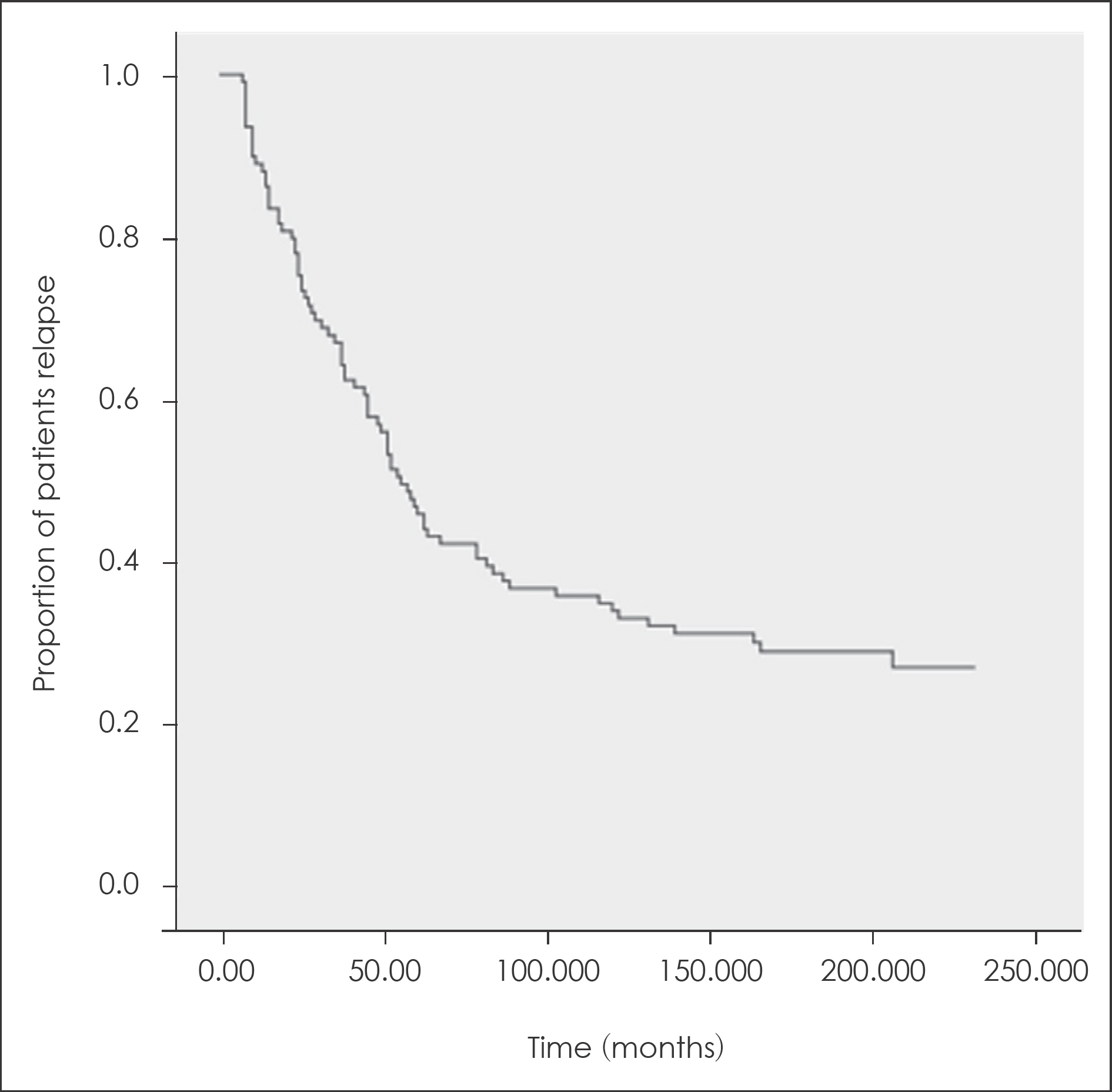Korean J Schizophr Res.
2015 Oct;18(2):66-72. 10.16946/kjsr.2015.18.2.66.
Factors Affecting Recurrence in Patients with Schizophrenia Received More Than 10 Years of Treatment
- Affiliations
-
- 1Department of Psychiatry, College of Medicine, Inha University, Incheon, Korea. kce320@inha.ac.kr
- KMID: 2103934
- DOI: http://doi.org/10.16946/kjsr.2015.18.2.66
Abstract
OBJECTIVES
The purpose of this study is to investigate the factors affecting recurrence in patients with schizophrenia received more than 10 years of long-term treatment.
METHODS
The medical records of long-term follow-up patients with the diagnosis of schizophrenia from department of psychiatry, Inha university hospital for more than 10 years were reviewed. The recurrence was defined as the re-emergence or aggravation of psychotic symptoms after maintenance treatment during 6 months.
RESULTS
Of the 110 patients who were included in the study, 78 patients were recurred. Half of the patients were experiencing at least 1 recurrence within six years. After adjustment of sociodemographic variables, female, poor drug compliance, younger baseline age, shorter duration of illness and longer duration of hospitalization at first admission were significantly related to an increased likelihood of recurrence. The most common stressor of recurrence was irregular drug taking (61.73%).
CONCLUSION
The results show the importance of gender, drug compliance, baseline age, duration of illness, and duration of hospitalization at first admission in predicting recurrence of long-term follow-up patients with schizophrenia.
Keyword
MeSH Terms
Figure
Cited by 1 articles
-
Differences in Social and Clinical Characteristics between Readmission and Dehospitalization in Long-Term Inpatients with Schizophrenia
Min-Sun Kim, Sunyoung Park, Jin-sook Choi
Korean J Schizophr Res. 2020;23(1):38-44. doi: 10.16946/kjsr.2020.23.1.38.
Reference
-
1). Gelder M, Andreasen N, López-Ibor J, Geddes J. New Oxford Text-book of Psychiatry. Oxford: Oxford University Press;2000.2). Pigott TA, Carson WH, Saha AR, Torbeyns AF, Stock EG, Ingeni-to GG. Aripiprazole for the prevention of relapse in stabilized patients with chronic schizophrenia: a placebo-controlled 26-week study. J Clin Psychiatry. 2003; 64:1048–1056.3). Almond S, Knapp M, Francois C, Toumi M, Brugha T. Relapse in schizophrenia: cost, clinical outcomes and quality of life. BJP. 2004; 184:346–351.4). Knapp M, Mangalore R, Simon J. The global cost of schizophrenia. Schizophr Bull. 2004; 30:279–293.5). Doering S, Müller E, Köpcke W, Pietzcker A, Gaebel W, Linden W, et al. Predictors of relapse and rehospitalization in schizophrenia and schizoaffective disorder. Schizophr Bull. 1998; 24(1):87–98.
Article6). Goodpastor WA, Hare BK. Factors associated with multiple readmissions to an urban public psychiatric hospital. Hosp Community Psychiatry. 1991; 42:85–87.
Article7). Lin CH, Chen WL, Lin CM, Lee MD, Ko MC, Li CY. Predictors of psychiatric readmissions in the short- and longterm: a population-based study in taiwan. Clinics (Sao Paulo). 2010; 65:481–489.
Article8). Kane JM. Pharmacologic treatment of schizophrenia. Biol Psychiatry. 1999; 46:1396–1408.
Article9). Gilbert PL, Harris MJ, McAdams LA, Jeste DV. Neuroleptic with-drawal in schizophrenic patients: a review of the literature. Arch Gen Psychiatry. 1995; 52:173–188.10). Gitlin M, Nuechterlein K, Subotnik KL, Ventura J, Mintz J, Fogel-son DL, et al. Clinical outcome following neuroleptic discontinu-ation in patients with remitted recent-onset schizophrenia. Am J Psychiatry. 2001; 158:1835–1842.
Article11). Ayuso-Gutiérrez JL, del Río Vega JM. Factors influencing relapse in the longterm course of schizophrenia. Schizophr Res. 1997; 28:199–206.
Article12). Gaebel W. Towards the improvement of compliance: the significance of psychoeducation and new antipsychotic drugs. Int Clin Psychopharmacol. 1997; 12(Suppl 1):S37–42.13). Hudson TJ, Owen RR, Thrush CR, Han X, Pyne JM, Thapa P, et al. A pilot study of barriers to medication adherence in schizophrenia. J Clin Psychiatry. 2004; 65:211–216.
Article14). Valenstein M, Blow FC, Copeland LA, McCarthy JF, Zeber LE, Gillon L, et al. Poor antipsychotic adherence among patients with schizophrenia: medication and patient factors. Schizophr Bull. 2004; 30:255–264.
Article15). Lacro JP, Dunn LB, Dolder CR, Leckband SG, Jeste DV. Prevalence of and risk factors for medication nonadherence in patients with schizophrenia: a comprehensive review of recent literature. J Clin Psychiatry. 2002; 63:892–909.
- Full Text Links
- Actions
-
Cited
- CITED
-
- Close
- Share
- Similar articles
-
- Factors Affecting Treatment Discontinuation and Treatment Outcome in Patients with Schizophrenia in Korea: 10-Year Follow-Up Study
- Investigating the Intrapsychic Factors that Affect Quality of Life in Patients with Schizophrenia
- Factors associated with Empathy in Patients with Schizophrenia in Psychiatric Rehabilitation Centers
- Suicidality and Related Psychopathology across Different Stages of Schizophrenia
- Metabolic Side Effects of Antipsychotic Medication: An Overview



